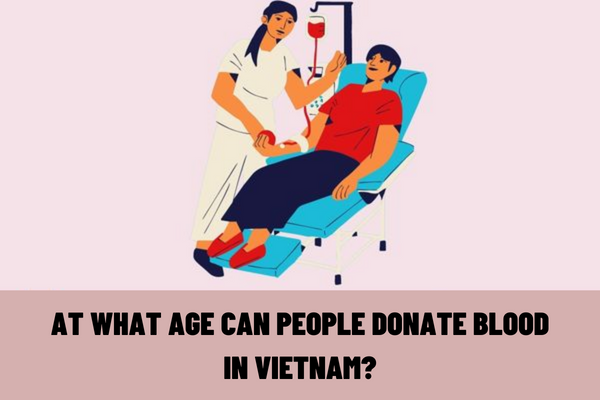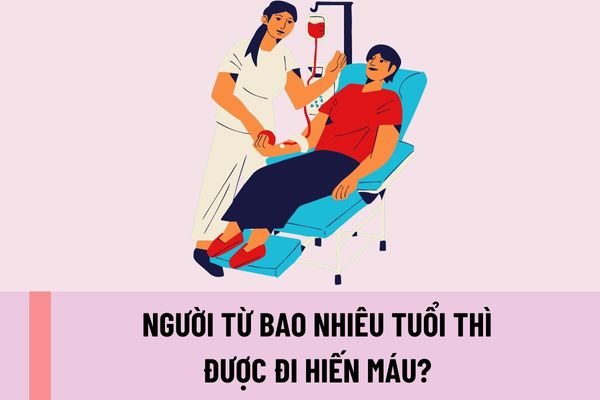At what age can people donate blood in Vietnam? How much weight does it take to donate blood in Vietnam?
At what age can people donate blood?
Pursuant to Clause 1, Article 4 of Circular No. 26/2013/TT-BYT stipulating as follows:
Blood donor eligibility in Vietnam
Blood donor must meet age and health requirements as well as others which are specified below:
1. Age: from enough 18 to 60 years.
According to the above regulations, a person who is eligible to donate blood is a person from full 18 to 60 years old.

At what age can people donate blood in Vietnam? How much weight does it take to donate blood in Vietnam?
How much weight does it take to donate blood?
Pursuant to Point a, Clause 2, Article 4 of Circular No. 26/2013/TT-BYT and point b, Clause 2, Article 4 of Circular No. 26/2013/TT-BYT stipulating as follows:
Blood donor eligibility in Vietnam
…
2. Health:
a) Those who weigh at least 42 kg for female, 45 kg for male are eligible for whole blood donation; those who weigh from 42 kg to under 45 kg are permitted to donate less than 250 ml of whole blood per each donation; those who weigh 45 kg or more is permitted to donate their whole blood volume of 90 ml/ kg in weight and less than 500 ml per each donation.
b) Those who weigh at least 50 kg are eligible for blood donation apheresis; blood donors are able to donate one or a wide range of blood component(s) in each donation apheresis, but total volume of donated blood is restricted to less than 500 ml; those who weigh at least 60 kg are eligible to donate total whole-blood volume of less than 650 ml in each donation.
According to the above regulations, the health standards of blood donors are prescribed as follows:
- Whole blood donation:
+ People weighing at least 42 kg for female,
+ People weighing at least 45 kg for male.
- Donate less than 250 ml of whole blood per each donation
People weighing from 42 kg to less than 45 kg
- Donate their whole blood volume of 90 ml/ kg in weight and less than 500 ml per each donation:
People weighing 45 kg or more.
- Blood donation apheresis:
Person weighing at least 50 kg
Blood donors are able to donate one or a wide range of blood component(s) in each donation apheresis, but total volume of donated blood is restricted to less than 500 ml.
- Eligible to donate total whole-blood volume of less than 650 ml in each donation:
Person weighing at least 60 kg
What are the standard blood donor testing criteria? What are the clinical standards for blood donors in Vietnam?
Pursuant to the provisions of Point dd, Clause 2, Article 4 of Circular No. 26/2013/TT-BYT stipulating the testing standards of blood donors as follows:
- With respect to the whole-blood donor and the donor who makes an apheresis donation of blood components, the hemoglobin concentration must equal at least 120 g/l; if the volume of whole blood donated is more than 350 ml, the minimum volume of whole blood drawn must be at least 125 g/l.
- With respect to the donor who makes an apheresis donation of plasma, the concentration of plasma protein separated from the whole blood must equal at least 60g/l and must be tested within a period of less than 01 month;
- With respect to the donor who makes an apheresis donation of platelets, granulocytes and stem cells, the number of platelets must be greater than or equal to 150x109/l.
At the same time, according to the provisions at Point d, Clause 2, Article 4 of Circular No. 26/2013/TT-BYT, the clinical standards for blood donors are as follows:
- Have the normal state of consciousness and perception;
- Have the systolic pressure measured in the range from 100 mmHg to below 160 mmHg and diastolic pressure measured in the range from 60 mmHg to below 100 mmHg;
- Have the regular heart beat with the frequency ranging from 60 to 90 beats per minute;
- Do not show one of the following signs: light weight and fast weight loss (losing more than 10% of gross body weight within 6 months); pale skin or mucous membrane; dizziness or dazzle; night sweat; big nodes occurring throughout the body; fever; oedema; cough, dyspnea; diarrhea; hemorrhage of all types; injuries or abnormal skin conditions.
What documents do blood donors in Vietnam have to present?
Pursuant to Article 7 of Circular No. 26/2013/TT-BYT stipulating as follows:
Registration and management of information about blood and blood component donation
1. Blood and blood component donor must submit one of the following documentation: Identity card, passport, military and police identification card, driving license, work card, student card, blood donation card, blood donor certificate or personal status confirmation issued by local agencies, organizations, unions or authorities.
2. The blood or blood component donor must completely answer the questions about the blood donor's health stipulated by the Appendix 2 enclosed herewith.
3. Blood collecting facilities must manage blood donor information according to the file system stipulated by the Appendix 3 enclosed herewith. Personal information about the blood donor must be kept confidential and only used for the purpose of guaranteeing the normal health condition of the blood donor and preventing diseases from infecting the donated blood recipient.
According to the above regulations, blood donors and blood components must present one of the following documents:
- Identity card/Citizen ID card
- Passport
- Military and police identification card
- Driving license
- Work card
- Student card
- Blood donation card, blood donor certificate or personal status confirmation issued by local agencies, organizations, unions or authorities.
LawNet
